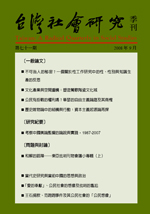
《台灣社會研究季刊》 第71期:

一般論文
不可告人的秘密?一個關於性工作研究中的性、性別與知識生產的反思/陳美華(71 民 97.09 頁 01-39)
知識生產並非在權力真空的情形下進行,作為社會存有的研究者往往就是影響整個研究過程的因素之一。本文將以筆者從事性工作研究的田野經驗為例,分析性別、階級與性這三個往往相互交織的社會範疇如何使得知識生產的過程成為權力的試煉場。筆者將指出,娼/良二分的意識型態如何使得研究者以性別分化的方式進入田野場址,以及女性研究者在性工作研究中的特殊情境。其次,在性工作長期被污名化的情形下,筆者和被研究的性工作者之間除了階級差異之外,性實踐上的差異尤其使得筆者悄悄挾帶進場的(性)偏見與預設影響了筆者的田野經驗。但,筆者被「誤認」為娼的過程,則使得筆者得以短暫地取得「圈內人」的位置,理解性工作者的生活處境。同時,當「自我」和「她者」戲劇性相遇時,女性主義者也因而得以看見自我的侷限性及未完成性,並和她者產生進一步的互動,讓所謂反思性的研究成為可能。文中筆者也將以訪談嫖客與皮條客的田野經驗闡明,主流科學研究去性化、去肉體化的傳統不僅讓個別的研究者在研究過程中因為個人的感官經驗與情緒感受而滿懷愧疚,甚至因為不敢挑戰此一學術禁忌而成為維繫此一禁忌的共犯。
關鍵字:反思性研究、性工作、性、性別、女性主義方法論
No knowledge is produced in a vacuum, devoid of social influences. The researcher's social existence greatly shapes and becomes embedded within academic knowledge. Using my fieldwork experience on sex work, I analyze the ways in which class, gender and sexuality are mutually reproduced and the process of knowledge production is politically charged. I argue that the ways in which researchers access the field are gendered due to the dichotomy of chang/liang(prostitute/non-prostitute; ‘madonna/whore’). Moreover, the differences between me/researcher and them/the researched in terms of class and sexuality also shape how I have come to understand sex work(ers) through my fieldwork. In many cases, my previous understanding of prostitution has had a great impact on how I have carried out fieldwork. I had believed that the sex industry was dominated by mafia organizations, which turned out not to be the case. In addition, the dichotomy of prostitute/non-prostitute is not so clear-cut in the field. My being ‘misunderstood’ as a streetwalker on the street turned me into an ‘insider’, albeit only temporarily, and enabled me to experience how it
feels to be a prostitute. Only after I entered the field did I realize that I had a deep-seated sense of shame regarding sex work; I felt uncomfortable being mistaken as a sex worker. This dramatic blurring of self and other has allowed me, as a feminist researcher, to reflect on myself as unfinished and incomplete, which is a condition that makes feminist reflexive research possible. In this paper, I also draw on my experiences interviewing punters and pimps to problematize the notion of the disembodied and de-sexualized knower that has been taken for granted in the mainstream scientific research. I conclude that the silence surrounding issues of class, gender and sexuality in the researcher's interaction with sex workers during academic fieldwork in the field not only serves to produce shamed researchers, but also reproduces and consolidates the tradition of disembodied and desexualized scientific knowledge.
Keywords:reflexive research, sex work, sexuality, gender, feminist methodology
文化產業與空間重構:塑造鶯歌陶瓷文化城/顏亮一、許肇源、林金城(71 民 97.09 頁 41-69)
本文以鶯歌作為研究個案,探討以下幾個問題:實質空間的安排與佈署如何支持了地方文化產業的發展?什麼樣的論述與制度介入並主導了該空間的意義?不同社群如何在這個空間中進行互動?在分析了鶯歌陶瓷老街、鶯歌陶瓷博物館、文化路、以及鶯歌陶瓷嘉年華等四個象徵性的空間或事件之後,本文指出都市結構的變更、歷史與傳統的發明以及不同行動者的空間實踐,乃是打造「鶯歌陶瓷文化城」最主要的力量。陶瓷老街和陶瓷博物館相互呼應,生產出鶯歌的「過度傳統」,使得作為社會過程的文化得以被篩選與凝結,成為可被消費的商品。至於真正見證了鶯歌文化與產業變遷的文化路街區,反而被擠壓到擬仿陶瓷文化場域的邊緣,而陶瓷嘉年華則成了地方權力競合的場域。最後,本文提出了重新爭取文化詮釋主導權、重新連結文化與生活、重新組織政治聯盟等策略,作為鶯歌邁向另類發展形式的參考。
關鍵字:主題環境、擬像、第三空間、文化產業、鶯歌陶瓷業
This essay aims to explore the following questions: How does the deployment of physical space support the development of local cultural industries? What discourses and institutions intervene and dominate the social meanings of this space? How do various social groups interact in this space? After taking a close look at four symbolic sites, namely, Yingge Ceramics Street, Yingge Ceramics Museum, Wenhua Road and Yingge Ceramics Carnival, this essay points out that the major causes shaping “Yingge Ceramics Culture” are the followings: the change of urban structure, the invention of history and tradition and the spatial practices of various social actors. Finally, in order to envision alternatives for Yingge’s local development, three strategies are proposed by this study, including regaining cultural hegemony, relinking culture and daily life and reforming political coalition.
Keywords:themed environment, simulation, Thirdspace, cultural industries, Ceramics in Yingge
公民有拒戰的權利嗎?華瑟的自由主義論證及其商榷/陳宜中(71 民 97.09 頁 71-108)
面對統治者出於各種因素所發動、挑起、導致或遭致的戰爭,公民是否有權利進行批判,甚至起而反抗?被強制徵召到的公民,無論是平民還是軍人,又是否有權利拒絕戰爭動員?在任何情況下,公民都有絕對服從於軍令的政治義務嗎?本文以「公民是否有拒戰的權利」作為問題意識,以著名的義戰理論家華瑟作為討論對象,對其拒戰權利理論進行分析和批評,以釐清支持拒戰權利的道德理由可能何在,並探究其倫理和政治意涵。本文通過分析指出,華瑟為公民拒戰權利(亦即免於強制性戰爭動員的權利、以及抵抗強制性戰爭動員的權利)所提供之辯護,係建立於「自我保存」的道德理由。雖然他的論證有效凸顯出「自我保存」的政治道德份量,但卻仍有值得斟酌之處,尤其未能從美國以外的全球視野,更充分地開展公民拒戰權利的豐富意涵。通過理論與現實的交錯對照,本文對華瑟的自由主義論證進行商榷,從而指出一些更具批判性的思考方向。
關鍵字:華瑟、戰爭、拒戰、良心拒絕、自我保存
Do citizens have a right to war refusal? What does such a right mean, morally and politically? Could it be justified? And how could it ever be partially realized in the present-day world of nation-states? Through a critical examination of Michael Walzer's liberal arguments, this article aims to clarify several important ethical and political issues regarding the “right to war refusal” and its realization.
Keywords:Walzer, war, war refusal, conscientious refusal, self-preservation
歷史唯物論中的結構與行動:資本主義起源論再探/萬毓澤(71 民 97.09 頁 109-156)
馬克思主義者向來對歷史唯物論持有不同見解,並且發展出幾種對資本主義起源的不同詮釋方式,至今仍然沒有定論。本文試圖在有限的字數內,以後者的相關討論為例,來勾勒一種比較靈活的歷史唯物論模型。本文首先追溯了第二國際以降馬克思主義歷史理論(尤其是G. A. Cohen)的發展(偏向結構決定論或某種版本的演化論),接著討論「政治馬克思主義」論者的作品(偏向唯意志論,強調資本主義純粹是階級鬥爭下的非意圖後果),最後本文引介了Alan Carling 的作品,以他對資本主義的起源(封建分裂命題)與資本主義的勝利(競爭首要性命題)的分析為例,說明歷史唯物論有可能適當地將結構與行動因素整合進解釋架構之中,而不致偏廢任何一方。
關鍵字:歷史唯物論、結構與行動、過渡論戰、布蘭納論戰、政治馬克思主義、唯意志論、柯恩、卡林
Marxists have developed different interpretations of historical materialism, which in turn have informed the debates among Marxists over the origins of capitalism. This paper is an attempt to outline a more flexible version of historical materialism by taking stock of the related discussion on the origins of capitalism. I first trace the development of Marxist theory of history from the Second International to G. A. Cohen (which accepted a relatively more deterministic reading of Marxism and encouraged a certain variant of evolutionism), and then discuss works by “political Marxists” on the agrarian capitalism in England (prone to voluntarism with their emphasis upon capitalism as an unintended consequence of class struggle). Finally,
Alan Carling’s works, which account for the rise and victory of capitalism on the basis of “feudal fission thesis” and “competitive primacy thesis”, are introduced to illustrate the possibility of incorporating both structure and agency into the explanatory framework of historical materialism.
Keywords:historical materialism, structure and agency, transition debate, Brenner debate, political Marxism, voluntarism, G. A. Cohen, Alan Carling
研究紀要
考察中國輿論監督的論說與實踐,1987-2007/馮建三(71 民 97.09 頁 157-195)
中國特有的「輿論監督」修辭與「傳媒作為第四權」的說法,外貌神似,遠多過相通之處。不過,由於過去20年來,它儼然已經成為官方所提倡的概念之一,是以在中國共產黨堅持傳媒是黨喉舌的背景下,許多論者無分左右,紛紛起而闡述及推動輿論監督的論述及實踐,試圖為新聞改革尋求新的動力,藉以拓寬傳媒的言論空間。本文指出,輿論監督是黨政行政權力的延伸,一方面起自現實壓力,但也來自於黨政中央的主觀作為,因此在2004年有黨內監督條例將輿論監督列為十種反腐敗與監督的機制之一。再者,作者表明,西方傳媒的新聞產製知識對於中國輿論監督的討論,並非完全沒有參考餘地。本文因此分別從「黨與行政、立法與司法」等面向,逐次考察、介紹與評估中國的輿論監督之發展,並儘量同時以源生自不同社會背景的相關論述與知識,與中國的論述及實際作為,有所對話。我們無法得知的是,究竟輿論監督在中國是否只進不退,或是進進退退,或甚至出現倒退。無法得知的部分原因,還不是靜態視之,則來自於中國幅員廣闊,各色人等的認知與利益瓜葛,其資訊不完整的範圍,可能大些。更重要的是,動態觀照,則有利與不利於輿論監督的事例及力量,同時並存。
關鍵字:輿論監督、西方新聞學、中國共產黨
As one of China’s peculiar discourses, “supervision by the press” is not the same as the “fourth estate” concept that the Western liberals position the media. To broaden areas where media could have more critical coverage, progressives in China, both the liberal and the left, have however made constant efforts, calling and endorsing “the supervision of the press”rhetoric and policy that the Chinese Communist Party seems to have been emphasizing during the past twenty years. This research note examines what is meant and achieved by “supervision by the press”, and reflects upon whether the Party, the executive, the legislative and the judiciary branches of the state has conducted anything to promote or demote its practices. Related instances from other societies, Taiwan included, are brought into comparison that might better inform us of China’s media performances.
Keywords:Supervision by the press, watchdog journalism, Chinese Communist Party
問題與討論
東亞批判刊物會議小專輯(上)
和解的路障─東亞批判刊物會議:編案/陳光興(71 民 97.09 頁 197-199)
東亞和解的路障:兩韓的情況及其區域性意涵/白樂晴(林家瑄 譯)(71 民 97.09 頁 201-213)
如何超克分斷體制?/陳宜中(71 民 97.09 頁 215-219)
兩岸「分斷體制」:回應白樂晴教授/陳光興(林家瑄 譯)(71 民 97.09 頁 221-228)
《南風窗》對東亞問題的關注史/寧二(71 民 97.09 頁 229-237)
亞洲的病理/葉彤(71 民 97.09 頁 239-247)
泛華文知識刊物與區域溝通:《思想》的期望/錢永祥(71 民 97.09 頁 249-254)
東亞論述與「近代適應和近代克服」的雙重課題/白永瑞(71 民 97.09 頁 255-274)
複合社會/甯應斌(71 民 97.09 頁 275-279)
和解的東亞共同體如何可能?/沈松僑(71 民 97.09 頁 281-286)
當代史研究與當前中國的思想與政治/賀照田(71 民 97.09 頁 287-313)
「愛的奉獻」、公民社會的想像及批判的尷尬/張慧瑜(71 民 97.09 頁 315-332)
王石捐款、范跑跑事件及其公民社會的「公民想像」/張慧瑜(71 民 97.09 頁 333-347)

